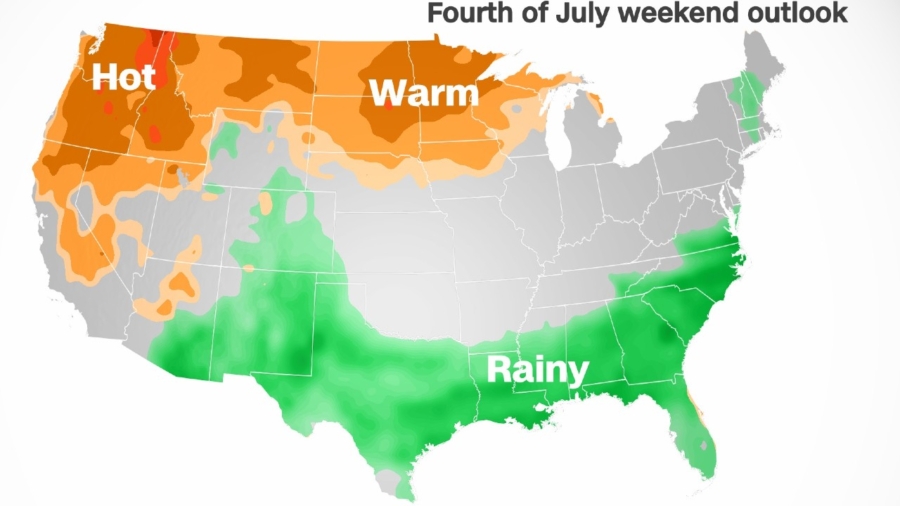The weather on the Fourth of July will either be too wet, too hot, or too dry, depending on location, as many people look to get outside and celebrate Independence Day for the first time in two years.
The South has been one area that has been consistently inundated with rain during the last few months. Most recently, Tropical Storm Claudette brought nearly a foot of rain to some areas in Mississippi and up to 8 inches in portions of Louisiana.
Houston has also had drenching rain with nearly 14 inches between May 11 and June 3, marking the second wettest period on record for the city.
Now, looking forward to the July Fourth weekend, the forecast looks like it’s going to be wet in the South yet again.
“Thankfully we have had somewhat of a break for the ground to dry out but we are reentering a wetter pattern,” said Brian Kyle, the lead forecaster at the National Weather Service (NWS) in Houston. “Deeper gulf moisture will be moving into the area, along with daytime heating will provide good chances of showers and storms each day.”
And that chance of rain will extend across the South and up the Eastern Seaboard this weekend. It will be a wet holiday weekend for millions.
As people head to the beaches for the long weekend, more showers and storms mean more risk.
“It’s a big time with the area beaches and rip currents are always a concern going into the holiday week,” Kyle said.

The isolated storms off the Gulf will bring periods of strong southerly winds which could create rip currents. They could also contain lightning and periods of very heavy rainfall.
“The biggest concern (in the Houston area) are the rainfall rates, more so than the amount,” Kyle said. “The metro areas with a lot of concrete can sometimes get rainfall rates of 3-inches plus an hour, and the ground just can’t absorb it that quickly. And that’s what typically causes the flash flooding in this part of the state.”
While the South contends with drenching rain, the West can’t seem to get more than a few drops. With 91 percent of the west in some level of drought, the conditions are dire.
“We talk to emergency managers and folks in the fire department and they say 4th of July is their busiest time of year, because of the likelihood of getting a lot of calls,” said NWS Las Vegas Meteorologist Chelsea Peters.
Most of the local fireworks are contained within the city, and don’t seem to spark as many wildfires, Peters said.
However, “house fires and trees in the backyard catch on fire because it’s so dry, so if any embers fall, roofs and trees could ignite.”
Las Vegas is still waiting on monsoon season—an annual period of summer rainfall—to begin. Peters is optimistic about the monsoon, but the rain has been so sparse that it might not be enough to overcome the persistent drought.
“Over the past year we haven’t had a whole lot of weather, particularly heavy rainfall events,” Peters said. “Looking at the big picture, a half an inch here and there is not going to help the deficit that we have in the region.”
Not to mention the heat: the West has endured excruciating heat waves in the first weeks of summer, including in the Pacific Northwest this past weekend. More than 15 all-time high-temperature records were broken in the Pacific Northwest on Sunday alone.
And the heat is expected to continue into the weekend.
While places like Seattle will see temperatures come down a little, interior Washington and Oregon will continue to see temperatures in the triple digits. It won’t be quite as hot as this past weekend, but temperatures will run at least 20 degrees above normal in some locations.
This not only makes it dangerous and uncomfortable, but it also worsens the drought that is already at a critical level.
“We have already had a few rounds of excessive heat and summer has just begun, so that is continuing to dry out the little bit of moisture we have had,” Peters said.
Some jurisdictions are canceling fireworks because of the historic drought, to prevent wildfires. Salt Lake City Mayor Erin Mendenhall told residents last week that fireworks just aren’t worth the risk this year.
Fire officials in the San Francisco Bay Area warned that the grass is so dry, a lit sparkler would only take 30 to 60 seconds to ignite a blaze that could no longer be controlled by a garden hose.


